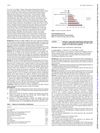 421 citations,
January 2015 in “Chemical Society Reviews”
421 citations,
January 2015 in “Chemical Society Reviews” Improving artificial vascular grafts requires better materials and surface designs to reduce blood clotting and support blood vessel cell growth.
 September 2024 in “Journal of the American Academy of Dermatology”
September 2024 in “Journal of the American Academy of Dermatology” Phenoxyethanol in hair growth products may be linked to frontal fibrosing alopecia.
January 2025 in “Cosmetics” Exosomes could improve skin care, but more research is needed to confirm their safety and effectiveness.
 30 citations,
June 2017 in “Talanta”
30 citations,
June 2017 in “Talanta” MALDI Imaging Mass Spectrometry is a useful method for studying skin conditions, but sample preparation is crucial for accurate results.
 13 citations,
July 2019 in “Pediatric dermatology”
13 citations,
July 2019 in “Pediatric dermatology” Pediatric dermatologists need to understand the unique skin health needs of LGBTQIA youth to provide better care.
 20 citations,
October 2018 in “Aesthetic Plastic Surgery”
20 citations,
October 2018 in “Aesthetic Plastic Surgery” PRP shows promise for improving facial wrinkles, skin elasticity, and hair growth, but more research is needed to standardize its use and understand its effects.

Eating healthy, exercising, and certain nutrients like myoinositol and omega-3s can help manage PCOS symptoms.
 7 citations,
October 2019 in “Evidence-based Complementary and Alternative Medicine”
7 citations,
October 2019 in “Evidence-based Complementary and Alternative Medicine” Chinese medicine may help hair growth and reduce hair loss in androgenetic alopecia.
 192 citations,
January 2015 in “Journal of the American Academy of Dermatology”
192 citations,
January 2015 in “Journal of the American Academy of Dermatology” Targeted cancer therapies often cause serious skin problems that need careful management.
1 citations,
January 2020 in “Microscopy research” Researchers successfully grew hair follicle stem cells from mice and humans, which could be useful for tissue engineering and regenerative medicine.
 3 citations,
December 2016 in “Sexual medicine reviews”
3 citations,
December 2016 in “Sexual medicine reviews” The document concludes that better research methods are needed in men's sexual health to provide stronger evidence and improve patient care.
 10 citations,
January 2012 in “Journal of biomedical optics”
10 citations,
January 2012 in “Journal of biomedical optics” Melanin density affects hair color, and this method can help in cosmetic assessments and diagnosing hair diseases.
 39 citations,
June 2017 in “Journal of Applied Research on Medicinal and Aromatic Plants”
39 citations,
June 2017 in “Journal of Applied Research on Medicinal and Aromatic Plants” Plant-based ingredients are effective and safe for modern skincare products.

Older men with late-onset lupus have a higher mortality rate than women.
 December 2016 in “The European health psychologist”
December 2016 in “The European health psychologist” Women with PCOS need more support to cope with isolation, helplessness, and grief, and to build resilience.
 15 citations,
January 2019 in “International Journal of Women's Dermatology”
15 citations,
January 2019 in “International Journal of Women's Dermatology” Early treatment helps stop hair loss in women of color.
 July 2023 in “Chinese Journal of Dermatology”
July 2023 in “Chinese Journal of Dermatology” COVID-19 may cause common hair loss due to stress, immune response, medications, and other health issues.
 December 2024 in “World s Veterinary Journal”
December 2024 in “World s Veterinary Journal” Treatment with specific medications and supplements improved skin condition and hair regrowth in an Akita with sebaceous adenitis.
 March 2024 in “Indian Journal of Dermatology/Indian journal of dermatology”
March 2024 in “Indian Journal of Dermatology/Indian journal of dermatology” Exosomes could be key in treating skin conditions and healing wounds.
59 citations,
July 1972 in “Biochemistry” Transamidases help form strong crosslinks in hair proteins, crucial for hair strength.
1 citations,
January 2017 in “Indian Dermatology Online Journal” PRP treatment can improve hair density and thickness in male pattern hair loss, but better preparation methods are needed.
 March 2024 in “Facial plastic surgery clinics of North America”
March 2024 in “Facial plastic surgery clinics of North America” Finasteride and minoxidil are approved treatments for hair loss, and hair transplants can be effective but require careful patient selection.
 December 2021 in “Biomedical journal of scientific & technical research”
December 2021 in “Biomedical journal of scientific & technical research” Oral processed egg yolk improves hair regrowth and quality in alopecia patients.
 10 citations,
March 2015 in “PubMed”
10 citations,
March 2015 in “PubMed” Scalp micropigmentation, a cosmetic tattoo technique, is a promising non-surgical treatment for hair and scalp deformities, despite potential complications.
 May 2023 in “Photobiomodulation, photomedicine, and laser surgery”
May 2023 in “Photobiomodulation, photomedicine, and laser surgery” The 675 nm laser treatment significantly increased hair density and reduced symptoms of androgenetic alopecia in both men and women, with no side effects.
 10 citations,
July 2011 in “Wound Repair and Regeneration”
10 citations,
July 2011 in “Wound Repair and Regeneration” New antiscarring strategies show promise, including drugs, stem cells, and improved surgical techniques.
 3 citations,
June 1999 in “Seminars in Cutaneous Medicine and Surgery”
3 citations,
June 1999 in “Seminars in Cutaneous Medicine and Surgery” Hair transplantation can effectively treat female pattern hair loss with the right patient selection and surgical skill.
 220 citations,
August 1988 in “Clinical endocrinology”
220 citations,
August 1988 in “Clinical endocrinology” Melatonin may help with sleep issues, depression, and cancer, but more research is needed.
 December 2023 in “Farmateka”
December 2023 in “Farmateka” Minoxidil is an effective and safe treatment for common hair loss when applied to the skin, but more research is needed for optimal use.
1 citations,
January 2009 in “Elsevier eBooks” Lasers can reduce hair growth but may also damage skin.
























